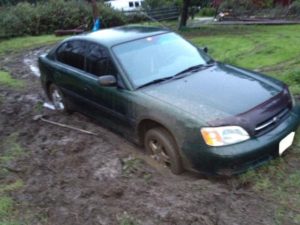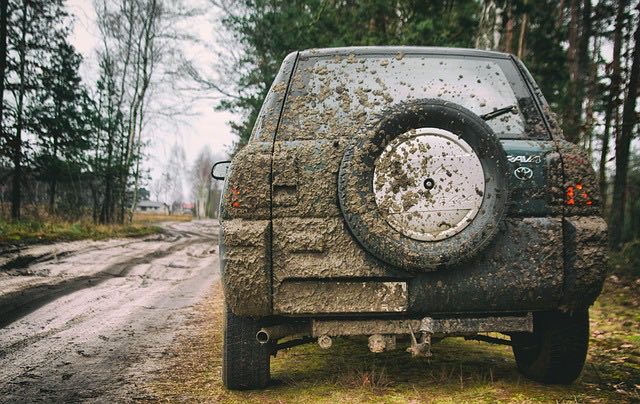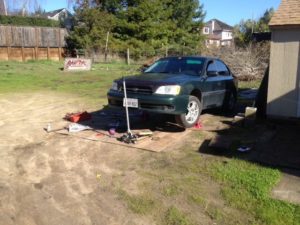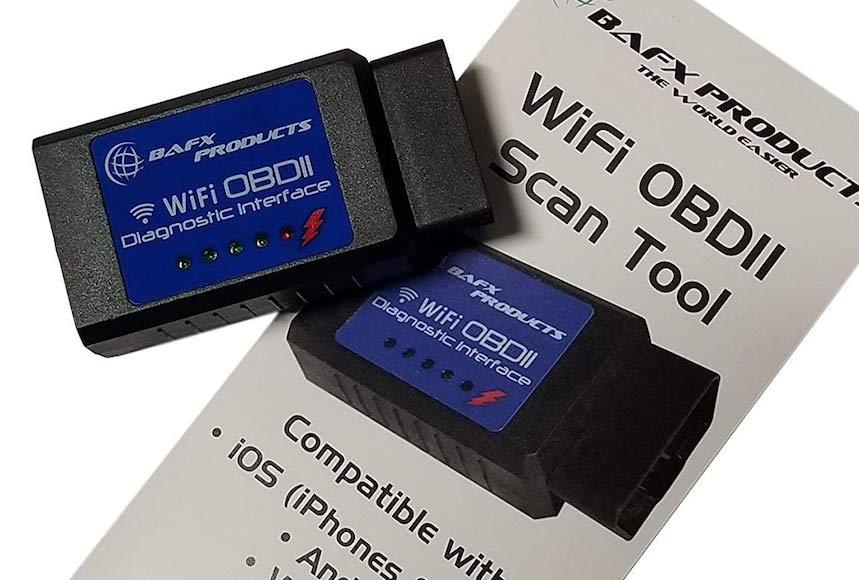Table of Contents
After getting stuck in the mud is your car/truck/SUV shaking?

I bring you this tip because I was just at a mechanic shop looking at buying a scooter he was selling. He was working on a 90’s Honda CRV and we got to talking about the car.
He told me the customer complaint was “the car was shaking like mad at 50mph plus.” He said the tires had some cupping, but he wasn’t really sure why it was causing such a crazy shaking at higher speeds.

I happened to spot something I had battled before with the same exact symptoms, dried mud on the inside of the front rims. Once I mentioned it, he was looked a little shocked that some guy in his mechanic shop had just spotted something he didn’t, then he was like “oh, yeah that is probably it.”
Rinse your car/truck/SUV after any muddy drives:
Especially if you got stuck in the mud. You need to rinse out the underside of the vehicle. Focus directly on the inside of the rims. Seriously, a high-quality pressure washer makes short work of this.
I personally love pressure washers, and there are some awesome ones you can get online these days. I always buy used ones on Craigslist that won’t start because of bad gas and fix them up. But these days, I would definitely recommend investing in either a high-powered electric pressure washer or a mid-level gas pressure washer
. Both of those links go to Amazon and two brands I highly recommend.
I totally believe everyone should own a pressure washer, they are just so much fun and clean so well.
 Car shaking while driving fast comes in two different varieties:
Car shaking while driving fast comes in two different varieties:
Car/Truck/SUV Steering Wheel Shakes While Braking:
- The most likely culprit is the front brake rotors. These become out of round and cause front wheel shake while braking (mostly noticeable above 50mph).
- There is a ton of information online about diagnosing, replacing, and inspecting your brake rotors. Make sure to notice whether your shaking is happening while braking or not. These are two very different clues which are very important.
Car/Truck/SUV/RV Shakes While Not Braking But Driving Above 40mph+:
- 9 times out of 10 a steering wheel shake at higher speed is caused from a tire balance problem
- Most often the shaking is directly a result of an out of balance tire.
- If you notice a shaking from 40-50 mph, inspect your tires for any noticeable issues.
- Then drive to a tire shop and ask them to check the balance on your front two tires.
- Even better, but more costly, is to have them rebalance all four tires.
- Ask politely if they will also pay attention to whether you have a bent rim or not on any tires while the tires are spinning on the machine.
- Diagnosing a bent rim without a tire balancing machine can be a pain in the butt. Remember to ask, or they probably won’t pay attention to this detail.
- Even better, but more costly, is to have them rebalance all four tires.
Car/Truck/SUV/RV Shakes at Slow Speeds 25mph or less:
This most likely is a serious issue. It could be caused by the tire tread separating or other major problem with a tire. If not a tire problem, then it could be a serious drive axle issue or driveline problem. Do not risk driving your car far like this. I would recommend calling a tow truck if you can’t see anything noticeably wrong. This is in the realm of a professional mechanic.
Do not risk have a tire blow out on the freeway. There is a lot to notice on a tire that takes a trained eye. Unless you’re really good at diagnosing tires or driveline issues please ask for help.
If you really want to try to tackle a slow speed wheel shaking then try these steps:
- Jack the vehicle up in the air on jack stands so that drive wheels are not touching the ground.
- Get in the vehicle
- Start it up
- Get it up to the speed where you feel the shaking or vibration
- See where it is coming from
- Be very careful, if the car comes off the jack stands it will launch forward
- This is definitely best done on a lift where you safely have the car off the ground
- I 100% have done this, and I also 100% do not recommend doing this. Every time I am running the car while it is just on jack stands I see my life flash before my eyes.
- It is really not worth saving yourself a couple hundred dollars.
- But if you got no other choice this is a great way to see what is happening.
- If you want to be an extra crazy daredevil get under the car and have someone else get it up to the speed where it starts to vibrate.
- Check for driveline vibrations or any parts that look like they aren’t spinning balanced.
- Make sure to KISS (Keep it Simple Stupid) always make sure the tires are balanced, not cupped, and installed correctly.
- Double check that no rims are bent.
Car starts to shake at very high speeds (100mph+)
This was a problem with my friends BMW M3. At speeds less than 100mph there would be no real noticeable steering wheel shake. However, when we would go over 100mph, there was a very noticeable steering wheel shake. It would get worse the faster we went, and at those high speeds, it is unnerving, to say the least. It turned out to be a couple of rims that were very minutely bent. It took taking the rims to an actual tire shop that specializes in race cars for them to diagnose the problem. Most tire shops don’t pay enough attention to small imperfections in the rims that will show themselves at higher speeds.
The moral of the story is if you’re going to drive really fast, make sure your rims are straight and true. It is also true that any cupping or tire imperfections will show themselves at higher speeds. If you plan on doing over 100mph, make sure all your tires are good and your rims are straight.
What professional technicians recommend if your car is shaking:
- Is it associated with a pop or clunk coming and going from a stop?
- If yes, check the radius arm bushings.
- Is it a 4×4? Try putting it into 4×4 if the shake is gone look at u-joints.
- What frequency is the shake at? Can you drop a gear or throw it in neutral, disengage the traction control system, and clear it up?
- No difference in neutral?
- Now you’ve narrowed it down to the driveshaft, rear end, rear tires for the most part.
- No difference in neutral?
- Poorly weighted rear brake drum can cause shaking/vibrations check rear drums.
- Bent or out of balance driveshaft or wheel?
- Can you isolate it front or rear? You can do this by jacking the car up like I said and running it until the vibration appears. You should be able to tell what part is bouncing around and causing the vibration.
- Check the Driveshaft. Especially if it’s the aluminum one.
- Shake while turning slightly? Seen a lot of rack and pinions on Fords do this.
- Shaking on acceleration? Check Driveshafts, CV axles for out of balance, Damaged CV axles.
- Car shaking after driving through an ice-storm? I wasn’t aware of this since I am from California (no snow)
- You probably just have some ice in your wheels. Get the tires off and check. They may be packed with snow and ice.
- Chip/thaw them out
- Test drive and make sure everything is A-ok.
- You probably just have some ice in your wheels. Get the tires off and check. They may be packed with snow and ice.
- Did you recently have a tire changed? Or did you recently change your tire?
- Check the tightness of the lug nuts and make sure they’re not put on backward. Photo to come.
- Also, check CV axle nut tightness. This working loose will cause a much more serious issue but can lead to vibration in the steering wheel and wobble on acceleration.
- Check your motor mounts.
Photos of common problems causing steering wheel shake:


 Car shaking while driving fast comes in two different varieties:
Car shaking while driving fast comes in two different varieties:












